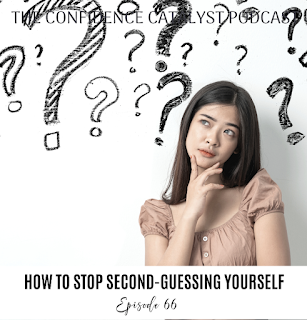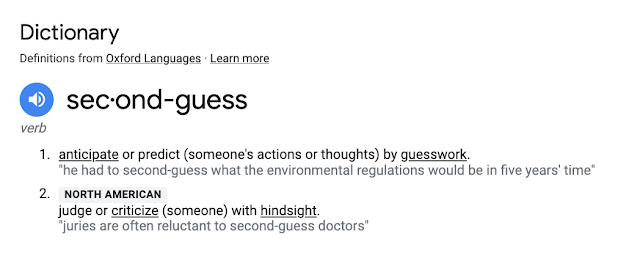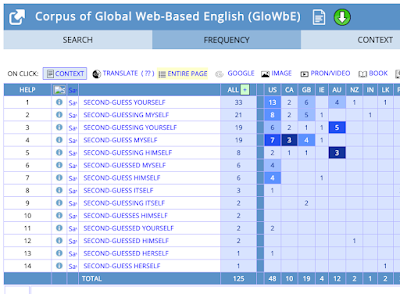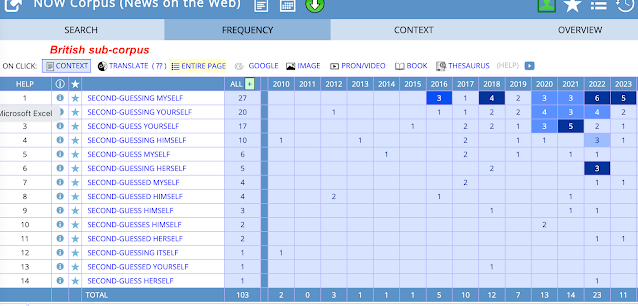 |
| Image from here |
At the Bavard Bar in St Leonard's a few months ago, a Bavardier asked me if I'd noticed the difference between the US and UK meanings of second-guess. I hadn't! She felt that the US meaning was overtaking the UK meaning, but whose meaning is really whose?
Here's what Oxford Languages says:
 |
For me, 'judge with hindsight' doesn't capture how I use second-guess. Here's me using it in The Prodigal Tongue, talking about the acts of faith we need to take in communicating:
when you’re talking with people from other places, you cannot second-guess every noun and verb you utter.
If we use a substitution test to see which of the definitions above fits with it, it's not very satisfying.
- you cannot anticipate every noun and verb you utter.
- you cannot judge with hindsight every noun and verb you utter
Neither seems to me to capture what I meant, which was something more like:
- you cannot spend time doubting and re-thinking every noun and verb you utter
This sense of 'doubt' seems to come through when second-guess is used with a reflexive (-self) pronoun, as in I spend too much time second-guessing myself and, it turns out, there are about 2.5 times more second-guessing of oneself in the American part of GloWbE corpus as in the British part:
Wiktionary's definition might be more in line with my intuitions of the meaning.
- (idiomatic) to vet or evaluate; to criticize or correct, often by hindsight, by presuming to have a better idea, method, etc. quotations ▼
- Please don't try to second-guess the procedure that we have already refined and adopted.
- Once she began listening to her instincts and didn't second-guess herself the entire time, her artwork improved noticeably.
Their use of the originally BrE verb to vet seems to capture what I meant in my sentence: 'One cannot vet every noun or verb for its dialect-appropriateness before it comes out of one's mouth.' I'm betting this usage has arisen by 'contamination' from a similar, but centuries-older phrase: have second thoughts about.
That's not to say I always use it in the 'vetting' way. Here's an example from an email I sent, replying to a question of whether students would like to join the staff in a reading group:
I don't think we should second-guess whether students would want to do it; I think we should just invite them.
This one has more the 'anticipate' sense. I don't think I picked that up in the UK. Rather, I think the phrase does more than one thing for AmE speakers.
So, is my fellow Bavardier right that things are changing in the UK? Let's look in the News on the Web corpus, since that covers the past 14 years, whereas the GloWbE data were from 2012. Using the same search string as I used in GloWbE (second-guess* *self), there is still 2.5 times more in the US subcorpus than in the British subcorpus. If we just search for second-guess* (without the *self), it's 2.2 times more in the US.
But we can see it really picking up in BrE since 2017:
So it feels kind of 'new' in BrE. But while it's older in AmE, there's certainly a great increase in its use in the past few years. Perhaps it's that increase in the US that's allowed it to be picked up in the UK:







OK so now I know why I'm never confident either using this phrase or understanding way people mean by it
ReplyDeleteWhat people mean, rather
ReplyDeletecomment catching comment
ReplyDeleteAustralian here. I think for me it's the "anticipate" definition, but more specifically in a situation analagous to an adversarial game like chess, where you have to consider different possible actions and all the ways that the other party may respond to each, leading to a multiplication of contingencies. (And unlike chess, in life you often don't even know what your opponent, so to speak, thinks the rules are. If I do X, people may get upset at me, but if I do Y, they might get upset for a different reason, so maybe I'm better off doing X after all). Your "doubting and rethinking" definition seems to be related to the "anticipate" definition, but with a change of object — instead of anticipating how a reader may interpret your choice of noun or verb, you've made the object the noun or verb itself.
ReplyDeleteUS — I agree with this.
DeleteI probably don't use it at all, but (BrE here) I think I understand it in all three uses.
ReplyDeleteI think I understand it in the senses of "No point in second-guessing what Mum will want to do"; and "I was second-guessing myself here, but I think I was right the first time!" (BrE, Southern, elderly).
ReplyDeleteBut what's the difference between second-guessing what Mum will want and guessing what Mum will want ?
DeleteI think that if you are second-guessing what Mum will want to do, you are rather assuming that she will want to do thus and so, whereas guessing could also involve other options....
DeleteInteresting. I've never heard of either of the "proper" definitions before now, and I'd always taken it to have the "second thoughts" meaning you talk about later on.
ReplyDeleteThank you for this. Goes to show you that dictionaries are often wrong! In fairness, since no one uses "anticipate" properly, maybe the first definition is right after all!
ReplyDeleteFWIW, your meaning of "second-guess" captures how I interpret it.
ReplyDeleteI (BrE by birth/35yrs of AmE) checked in with my wife (AmE) and we both agreed upon our understanding being close to Lynguist's but not quite. "Second-guessing" refers to a situation where an initial choice was made with a substantial element of uncertainty (i.e. "guessing") and then subsequently there is an attempt to revise that choice without any notable change in the uncertainly level associated with the new choice.
ReplyDeleteSo as an example, I am asked which movie I would like to see tomorrow night and I say "American Fiction" but was unsure because I also want to see "Poor Things". At some later point I say "actually, I think I'd prefer to see "Poor Things", and the person who asked me might say "I don't think you should second-guess yourself like that".
AmE speaker: I don't think I've ever come across second-guess to mean anticipate, or if I have, I likely misunderstood it. I use it primarily to mean "doubt" or "overthink" as you described in the book example. And even in the example from your email about second-guessing what students would want to do, I didn't read it at all as having an anticipate sense and more read it as "we shouldn't overthink whether students want to come or not; we should just invite them." Which I agree CAN be interpreted as anticipate but if you hadn't explicitly made this an example of second-guess used in the "anticipate sense," I never would have thought about it that way.
ReplyDeleteAlso an AmE speaker, I agree.
DeleteThe "rethinking" version shares a lot with the hindsight version. When applied to oneself, it happens almost instantaneously. You say something, or think of saying something, and then the immediate self-criticism is just instantaneous (maybe not simultaneous, but I'm not sure) hindsight.
ReplyDeleteInteresting. So I guess my British friends will not interpret "second-guess" as "Monday-morning quarterbacking."
ReplyDeleteThanks for your reference to Monday morning quarterbacking. It’s a dismissive or joking retort to someone who’s playing critic with the benefit of hindsight. As a Canadian, currently resident in New York and previously London, the expression second-guessing doesn’t imply either.
Delete… although I think that second-guessing can be used in a way thst’s synonymous.
DeleteI thought about "second guess" when I saw your email, and I realised I've never been sure what it means. I think in the past I've tried to work it out from the contexts in which it's used and also by trying to make sense of the "second" part, but without much success, perhaps because it's a bit slippery. Now I've read the post and comments, the senses which seem most familiar are those that speak of assumptions - that is, for me it suggests guessing what someone is thinking without proper investigation.
ReplyDeleteI’m 64 and have lived in London (England) most of my life, but have worked a lot with people from around the world.
ReplyDeleteI’ve mostly come across ‘second guess’ in referring to cases when someone has to make a judgmental decision and then their work superior or outside person (or outside organisation) reviews that decision and reaches a different conclusion. Usually the context is where the person making the first decision feels it is unfair to put them in a position where someone else will revisit the decision.
The perception of unfairness may be enhanced if the person making the first decision feels that the reviewer will use hindsight, and will criticise the first person unreasonably for not having had the benefit of hindsight. But I don’t think the element of hindsight is necessary (or even a main) component of the meaning.
I haven’t come across the idea of second guessing yourself, though I could imagine using it in the sense of your conscious mind second guessing your instinctive reaction.
I’ve not come across the meaning ‘anticipate a future event by guesswork’ and I don’t understand why it would be SECOND guessing in that case.
I agree with your definition...73 year old...born and still living in Southern California.
ReplyDelete(Hybrid AmE/BrE boomer here) I have always interpreted and used 'second-guess' to mean re-thinking a prior choice or decision; never realized that it had any other usage.
ReplyDelete